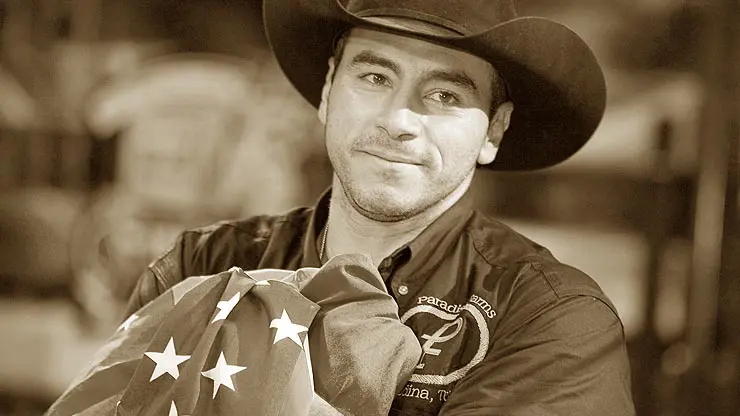
08.19.11 - Heroes & Legends
Heroes & Legends: Adriano Moraes
Today, five countries; tomorrow, the world
By PBR

Adriano Moraes did much more for the sport of bull riding than win three World Championships.
Before his arrival, Canadian and Australian riders had long since established themselves as perennial contenders, and even Mexico fostered a few bull riders over the years, though the sport wasn't all that organized there.
But with the emergence of Moraes, the PBR solidified itself as a viable international presence in five countries on three continents.
Moraes said until then, "nobody knew that South America had rodeos and bull riding."
He even noted, "Some people thought Brazil was another state in Mexico or something like that. It helped put Brazil on the map for the sport of bull riding."
Not only was the PBR founded to provided riders the opportunity to earn a better living than their forebears, but it stood as a beacon of hope "to anybody and everybody from anywhere in the world."
Moraes' world title in 1994 was only the beginning.
Troy Dunn became the second international rider to win a title in the PBR when the Aussie won in 1998, a year after winning his second World Finals event.
Moraes won two other world titles (2001, 2006) and fellow Brazilians Ednei Caminhas (2002), Guilherme Marchi(2008) and Renato Nunes (2010) also won championships. The top four contenders this year - Silvano Alves, Valdiron de Oliveira, Marchi and Robson Palermo - are all from Brazil.
"That's what the founding fathers of the PBR wanted," Moraes said. "They wanted to give the opportunity to anybody in the world who could ride bulls to be able to make a living and retire after the sport of bull riding. They don't have to spend 20 years of their youth riding bulls and then go be a flag man on a construction job."
There were a few Brazilian riders who came before Moraes, but none made anywhere near the lasting impact he did.
In fact, according to Moraes, there were 36 events in Brazil the year before he came to the U.S. for good. He won 12 and his rival won 12, but it was Moraes who was invited to compete at PBR events, largely because of his personal desire and dedication to the PBR.
"At the time, the PBR started out small," Moraes recalled, "but we knew that it would grow. It was not a dream, it was a project. A dream is something you just dream about. A project - you're working on it.
"It was small, but it was very well-organized."
"We stood together," he said of the riders involved in the mid to late 1990s, "not because of money, but because of what we had."
In 1994, Moraes said he saw an opportunity "to grow together."
Today he still sees the PBR as an opportunity.
But now his vision is less about seeing international riders come to America than it is about growing subsidiaries such as PBR Brazil, PBR Australia and PBR Mexico, as well as establishing standalone PBR events in European countries.
In 2001, Moraes produced four PBR events in Brazil, the winnings of which counted toward the qualifier standings for the World Finals.
Moraes, who now serves as president of ABBI Brazil, said that even though the sport was semi-organized in his home country, he never dreamed there would one day be a PBR office there, until it became a reality nearly six years ago.
Retired for nearly three years, Moraes is now focused on assuring that the PBR features the best riders from around the world.
"We don't lie when we say, 'This is a World Champion bull rider,'" he explained, "because all these guys who are professional - that ride anywhere in the world - will qualify to come to America and then they can earn points - they can only earn points at the Built Ford Tough Series - and be crowned World Champion.
"There's no doubt about it, when you watch the PBR, you are seeing the best guys in the whole world."
Moraes said he can see the PBR hosting events in Western Europe, Asia and even Russia.
A few years ago he met a Russian couple who traveled to Las Vegas not because they wanted to gamble, but because they were interested in seeing the Finals. That same year he met fans from England and Germany.
"If they're willing to fly over here," he said, "imagine when we're there."
He and Paulo Crimber have instructed bull riding clinics in Italy. Moraes said they worked with amateur riders from Spain, Italy and France, along with a few other Brazilians who traveled with them, but he admitted the quality of bucking bulls is significantly lower in other parts of the world.
But all it takes is one potential contractor to begin a breeding program.
Moraes said it's likely the PBR will host a foreign event within the next three to five years. He added, "The idea of opening more offices is to be more like soccer. … Wherever there is livestock they will ride bulls."
He believes that once the PBR begins hosting international events once or twice a year, it will encourage more foreign riders to practice. In turn, the PBR could open five to 10 spots in the draw at each event in order to scout the talent and watch their potential develop.
"Who knows, maybe in 20 years we're going to have an office in Japan, because they are already riding bulls there, or in Germany, because they are already riding bulls there, in Spain, in Italy, in France - they are already riding bulls there.
"The potential is there, but it's still very small," he continued. "That's my dream, to become the next soccer. … The world wants to see it. People are already watching us in over 85 countries."
- by Keith Ryan Cartwright